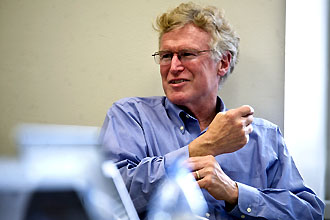Legal Ethics No Mystery
In preparing a presentation for a Tulane Law School seminar course titled "Jurisprudence in Literature," attorney and author Tony Dunbar reread his first mystery novel, Crooked Man, written 16 years ago. At the opening of his presentation, he shared with students that he was struck by how dated so much of the material seemed.

Mystery novelist Tony Dunbar tackles thorny legal issues during a law school seminar, challenging students to examine their own developing professional ethics. (Photo by Paula Burch-Celentano)
"They are always talking on car phones or using pay phones," said Dunbar at the seminar on March 24 in Weinmann Hall. "There's not a computer or cell phone in the whole thing."
In an observation more central to the theme of the course, Dunbar said he also noticed how much the rules and values regarding legal advocacy have changed over time. "When I went to law school and graduated and took the bar, the rule was that we owed a duty to represent our clients zealously within the bounds of the law," said Dunbar, an alumnus of Tulane Law School. "Instead of zealously, the rule today is a lawyer should act with reasonable diligence and promptness. That's wishy-washy, isn't it?"
Crooked Man is the first of seven novels in which Dunbar follows the adventures and misadventures of protagonist Tubby Dubonnet, a New Orleans lawyer who often navigates around thorny ethical issues in the company of any number of questionable characters.
Dunbar, who sits on a disciplinary committee for the Louisiana Bar Association, said he likes the "ethical platform" he built for Dubonnet.
"Tubby understands the gist of the rules but doesn't take time to read the rules very carefully."
Referencing the narrative device that launches the plot of Crooked Man, Dunbar challenged students to examine their own developing professional ethics.
"If a million dollars had landed on your desk, would you have kept the money?"
The question was followed by an amused if nervous silence.
"Literature often reveals things about the law that case law or straight legal reading don't," said Edward Sherman, W.R. Irby Professor of Law, who regularly teaches the seminar to third-year law students.
"It's the human side," said Sherman. "It's the uncertainty about the law, sometimes that seamy side."
